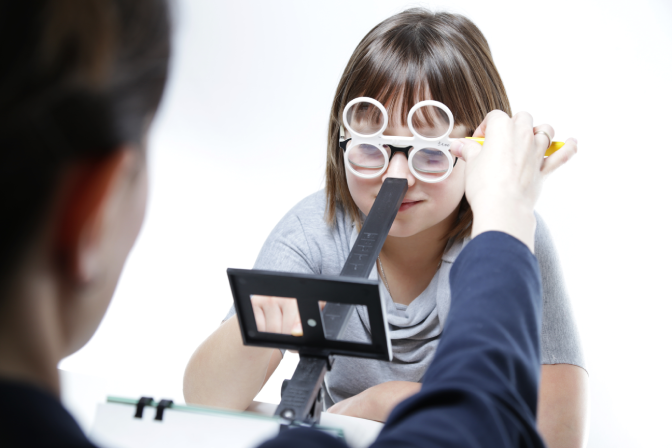Buy One, Get One 50% OFF Eyeglasses
* Restrictions apply. Ask a Team Member for details.
Vision Therapy in Troy, Alabama

Vision Therapy in Troy, AL at EyeCare Associates
EyeCare Associates is staffed with highly trained eye doctors who perform vision therapy services to help adults and children improve their vision. Our vision therapy providers at EyeCare Associates, such as Dr. Allen Dunn and Dr. Samara Perryman at our Troy State location, take a special interest in pediatric optometry, vision therapy, and sports vision enhancement. Both Dr. Dunn and Dr. Perryman are board-certified and strive to provide the best care for their patients by continuing to be on the cutting edge of new technology.
What is Vision Therapy?
Optometric vision therapy is conducted by optometrists and aims at improving and strengthening visual skills to help the eyes work more effectively and efficiently. Optometric vision therapy helps improve your eyes’ efficiency and your performance in life activities including school work, sports, driving, balance, and more. It can also help those individuals who lack the necessary visual skills for reading, writing, and learning.
Common Optometric Vision Therapy Exercises
This type of therapy uses a variety of eye exercises to not necessarily improve your eyesight, but more so to improve visual skills like focusing, eye-tracking, hand-eye coordination, visual processing, convergence, and more. Optometric vision therapy is structured as a performance enhancement program focusing on children and adults of any age or developmental stage. A vision therapy program typically consists of supervised exercises performed over weeks or months. In addition to exercises, lenses, prisms, filters, patches, computer-based programs, sensory integration techniques, electronic targets, or balance boards may be used.
How Does Vision Therapy Work?
Optometric Vision therapy consists of various exercises that help improve the connection and communication between your brain and your eye muscles. An optometric vision therapy program consists of supervised exercises performed over weeks to months.
In addition to exercises, lenses, prisms, filters, patches, computer programs, sensory integration techniques, electronic targets, or balance boards may be used.
Signs Vision Therapy Can Be Beneficial
Common signs and symptoms people experience that could be improved by optometric vision therapy included, trouble focusing, headaches, poor hand-eye coordination, squinting, blurry or double vision, binocular vision, eye strain, dizziness, and covering one eye.
Do I Need Optometric Vision Therapy?
If you have suffered a brain injury, vision therapy is used as a part of neuro-optometric rehabilitation services. This applies to concussion, stroke, birth trauma (ADD/ADHD), chemical trauma (chemotherapy), physical trauma, in-utero trauma (CP, FAS) or other forms of trauma or disorder, Individuals who wear glasses or contact lenses can also benefit from optometric vision therapy as it helps improve vision skills while the glasses and contact work to improve the clarity of vision.
Optometric Vision Therapy & Lazy Eye
A lazy eye is caused when one eye doesn’t have as strong of visual acuity, causing blurriness and poor vision. Both children and adults can have a lazy eye. Optometric vision therapy can help treat a lazy eye, as it helps improve the connection between the eyes and the brain.
Optometric Vision Therapy & Convergence Insufficiency
Convergence insufficiency is a common condition that causes trouble focusing on an object close to you. Convergence insufficiency means your eyes are not working as well to focus and comprehend books, phones, tablets, computer, and other items that are close to you. Convergence insufficiency can happen in both children and adults and causes trouble focusing on homework, reading, and computer work. Optometric vision therapy can help to improve your visual convergency.
Common Vision Therapy Exercises
EyeCare Associates offers three types of vision therapy: Developmental Vision Therapy, Neuro-Optometric Rehabilitation, and Sports Vision Training and our highly trained vision therapy team utilizes specialized equipment throughout the program such as:
Corrective and Therapeutic Lenses
Prism Lenses
Filters
Rotational Trainer
Right Eye and Right Eye EyeQ Reports — This device measures the accuracy and speed of eye alignment during reading, sports performance and gives a detailed report of the areas that may need treatment.
Sanet Vision Integrator (SVI) and Wii Balance Board — This instrument enhances visual tracking speed and accuracy.
Computer Orthoptics VTS4 — This technology measures and treats lazy eye, eye turn, eye-teaming, and eye-alignment issues.
Vectograms
Optics Trainer Eye Tracking Program
Signs Vision Therapy Can Be Beneficial
Common signs and symptoms people experience that could be improved by vision therapy included, trouble focusing, headaches, poor hand-eye coordination, squinting, blurry vision, eye strain, dizziness, and covering one eye. If you have suffered a brain injury, vision therapy is used as a part of neuro-optometric rehabilitation services. This applies to concussion, stroke, birth trauma (ADD/ADHD), chemical trauma (chemotherapy), physical trauma, in-utero trauma (CP, FAS) or other forms of trauma or disorder, Individuals who wear glasses or contact lenses can also benefit from vision therapy as it helps improve vision skills while the glasses and contact work to improve the clarity of vision.
Vision Therapy for Children
Vision therapy can be very beneficial for children who have learning difficulty, poor reading skills, trouble with hand-eye coordination, a lazy eye, and more. Some learning difficulties may stem from vision problems like convergence insufficiency which can cause poor focusing ability on an object close to them, like a book or tablet.

Find an Alabama Vision Therapy Center Near You
EyeCare Associates has eye doctors in the Troy, Alabama area who provide vision therapy services. Additionally, our trusted team of highly trained Alabama eye doctors focus on maintaining the health of your eyes with comprehensive eye care services. Our eyecare professionals provide routine eye exams, preventative care and treatment for many eye conditions.

Schedule an Appointment Today to Begin Vision Therapy
If you or your child lacks the necessary visual skills for reading, writing and learning (i.e. eye movement and focusing skills, convergence, eye-hand coordination, visual memory skills, etc.) then vision therapy might be beneficial for you. Call us today to schedule an appointment. Our eye doctors will conduct a comprehensive eye exam to help identify issues and determine the best exercises and treatment for vision therapy.
Frequently Asked Questions About Vision Therapy
Vision therapy can be very beneficial for children who have learning difficulty, poor reading skills, trouble with hand-eye coordination, a lazy eye, and more. Some learning difficulties may stem from vision problems like convergence insufficiency and not being able to focus on an object close to them, like a book or tablet.
Results can differ for every patient, but vision therapy has been proven to help with hand-eye coordination, improve focus and reading skills, alleviate eye strain and headaches, and more. Studies have shown that vision therapy and exercises may be helpful for a condition called convergence insufficiency which occurs when the eyes don’t work together or when a person has difficulty focusing on an object.
If you think your vision is good, but you still experience vision problems like trouble reading right in front of you, lack of depth perception, or poor hand-eye coordination, vision therapy can be beneficial. Vision therapy can also help those individuals who lack the necessary visual skills for reading, writing, and learning.